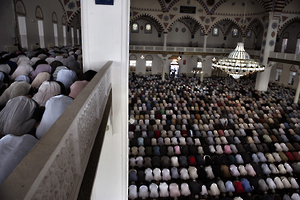
DAGESTAN SECURITY OFFICIALS SEARCH FOR TRAITORS IN THEIR RANKS
Publication: Eurasia Daily Monitor Volume: 2 Issue: 48
By:

A recent police search of insurgents in Dagestan turned up a list of the names, addresses, and telephone numbers of more than 100 security officials in the North Caucasus republic. The discovery has sent chills through the republic’s leadership and indicate the rebel’s increasing pressure on the authorities in Makhachkala, the capital of Dagestan.
Federal troops conducted several special operations in Khasavyurt during the first two months of 2005. The town is not far from Chechnya, and it is a popular retreat for members of both the Dagestani and Chechen insurgency. More than a dozen rebels have already been detained or killed there this year. On February 23, special police forces stormed a flat in Khasavurt, killing one insurgent and one policeman during the shootout (RIA-Novosti, February 23). On March 6, Russian spetsnaz and local policemen assaulted a private home in the village of Kadyr-Otar. Two rebels hiding in the house fought back with assault rifles and hand grenades. Both were eventually killed, and the chief of police in the Khasavyurt region was seriously wounded. On March 8, security officials reported that a Chechen field commander from Northern Chechnya (Shelkovskoy region) had also been arrested in Khasavyurt (RIA-Novosti, March 8).
While clean-up operations are going quiet well in Khasavurt, the situation in Makhachkala is worsening. The rebels set up an underground network in the city late in 2004. Mobile squads began to prowl the area, waiting to ambush cars carrying police officers. On December 3, 2004, Dmitry Kozak, Russian President Vladimir Putin’s envoy to the Southern Federal District, visited Makhachkala to discuss security issues with local authorities. Kozak told a joint meeting of the State Council and the government of Dagestan: “We should stop the wave of crimes, grave crimes.” He called Dagestan a “frontline zone,” with Chechnya as the front (yufo.ru, December 3, 2004).
However, Kozak’s visit failed to change the situation. On February 2, 2005, Magomed Omarov, a deputy minister of internal affairs, was shot dead in Makhachkala. A new wave of violence overtook the city, while the authorities became even more nervous. On February 11, Makhachkala’s mayor, Sayid Amirov, held a special meeting to discuss “measures to intensify the fight against terrorism, extremism, and organized crime” in the city. According to the Caucasus Times, during the meeting Amirov described the situation in Makhachkala as “critical.” Ahmednabi Magdigadzhiev, the secretary of the republican Security Council, said that the government of Dagestan had appealed to local clergy to call upon the people of Dagestan “to help law-enforcement agencies to fight extremism” (Caucasus Times, February 11).
The meeting participants also criticized the work of the local traffic police. Some officials were angry that policemen from the nearest traffic post had done nothing to help Omarov when the insurgents attacked his motorcade.
The traffic police became much more active after the meeting, but the insurgents stepped up their activity as well. Now, they began to bomb police posts. The Interior Ministry press service reported that there had been three attacks against local police between February 11 and February 14. On February 11, militants blew up a traffic police checkpoint. Two more explosions occurred on February 13, when a bomb exploded on Ahmed Khan Sultan Street at midnight as a police patrol car drove by. These most recent attacks left one dead and several policemen wounded (Caucasus Times, February 14). On March 4, a bomb exploded near a police station. One policeman was killed, while another officer and a nine-year-old bystander were injured (RIA-Novosti, March 4). On March 6, the insurgents ambushed a police car in the town of Kaspiisk not far from Makhachkala. One policeman died.
This new rebel offensive forced the authorities to take extra measures, such as checking all vehicles, including public transport. On March 6, in the Novy Kiyakhulai settlement five kilometers from Makhachkala, policemen stopped a public minibus for inspection. Two gunmen jumped out and started to shoot. Then one of them threw a hand grenade. Two policemen were killed and two more were wounded (TV Center, March 6). The insurgents were shot dead by return fire.
When the policemen began to search the bodies, they made a shocking discovery. The militants carried a list of high-ranking security officials, including their office and home telephone numbers and addresses. According to Dagestan’s Minister of Internal Affairs, Adalgirey Magomedtagirov, who came to the crime scene, the list contained names not only of the local police and Federal Security Service (FSB) officers, but also of those who had come from other parts of Russia to help their colleagues. “Such secret information could not have been provided without help from traitors,” he told the press (NTV, March 7).
On the same day, Sharia Jamaat, a Dagestani rebel group, published a statement on the Kavkazcenter website, where they admitted that the militants had obtained the list from officers working in the Ministry. The statement went on to say that policemen provide this type of data to insurgents to guarantee their own safety and to get rid of their career rivals with the help of gunmen. The statement said that the list contained 140 names.
If gunmen start to eliminate everyone on the list, it could seriously disrupt the work of local security agencies. Without effective police, the pro-Russian government would have to give over its power to the rebels. However, the government has not collapsed yet, and civil war has not overtaken Dagestan. The final result of this standoff is still unclear, but the government has full support from the Kremlin and all military forces of Russia. Nevertheless, Sharia Jamaat is not going to surrender, either.




